Van Gogh
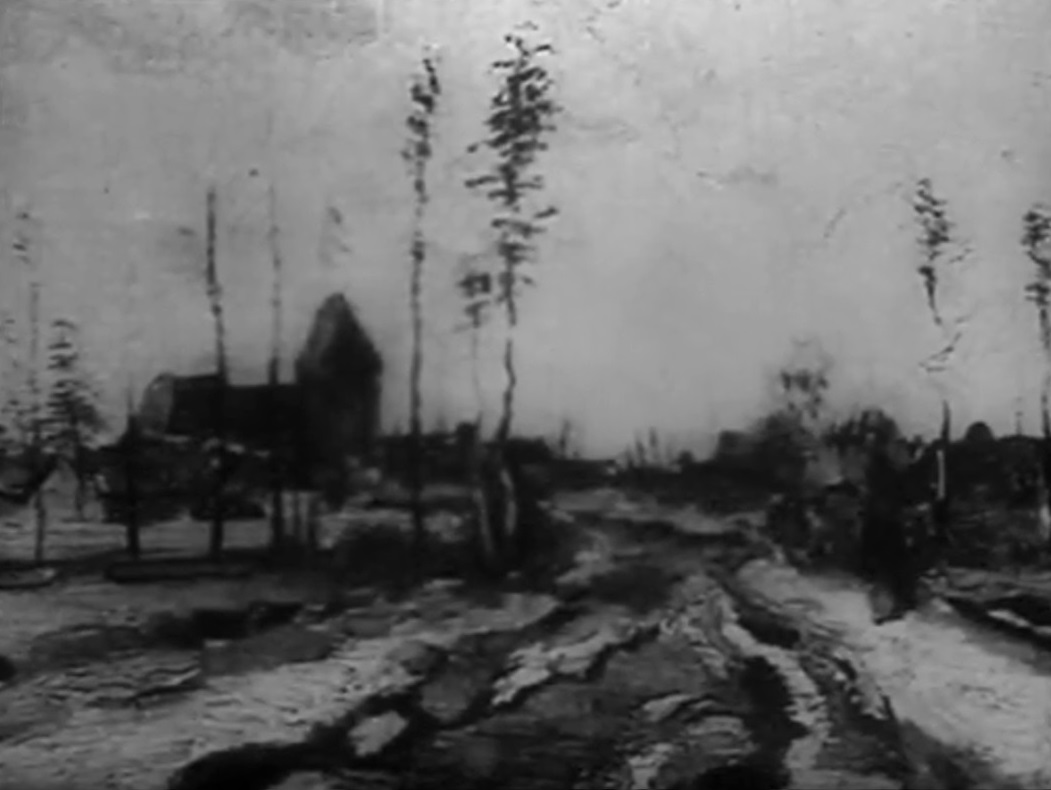
An analytical
instrument (monochromatic rostrum camera) of great power.
Which is to say,
the artist Vincent was at eight, with pen and ink or pencil.
“Il était
prédicateur, mais il prêchait mal, la violence de son foi effrayait les fidèles.”
The resemblance
to Leonardo is evident in one self-portrait. “Des hommes nouveaux à la recherche
d’un art nouveau.”
A sense of
dramatic form that serves Welles in F Is
for Fake. The famous “Auden”
self-portrait. Kafka and Char remember the geste, flung
“to wolves” or “the repugnant maw of death”,
notre ami Jethro “I reckon she admired it!”
Toujours les œuvres, rien que les œuvres, “uniquement à l’aide de ses œuvres.”
Paul Gauguin
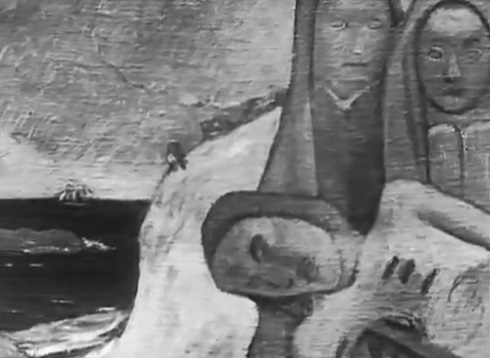
“...
l’un des plus grands peintres français.”
In
contradistinction to Resnais’ Van
Gogh, not achieved on the rostrum uniquement but by dint of a complete reading of his texts,
consequently a course on Gauguin in a dozen minutes worth so many years, Bonjour Monsieur Gauguin explicated at a
glance, the Breton Christs amidst “earth feet,
loam feet” in wooden shoes, Tahiti and the old gods.
What he painted,
what it cost in poverty and work.
Gaston Diehl, Darius Milhaud, Jean Servais.
Peter Harcourt (Film Comment), “the black-and-white
studies of Van Gogh (1948) and Gauguin (1950) both deal with men
whose personal lives were literally sacrificed to their art. And
yet—paradoxically—this personal degeneration was accompanied by the
frenzied affirmation of the artists’ art. Out of instability came
something external. Out of sickness, came a kind of health. The style of both
these films does nothing to point the moral. The commentary simply describes
the events in the artists’ lives with a clinical detachment as we look at
the paintings—paintings greatly robbed of their power to affect us by
being in black-and-white.”
Resnais has
plenty of footage by the Nazis themselves, and this is enough to convict them
as a self-styled “master race” of gibbering idiots and mental
slime, less than human and requiring no further consideration.
As a result, he and his colleagues stand simply agog at their good
fortune, it’s like having a camera on the scene and they know it, you
couldn’t have a better vantage point. Resnais
does nothing fancy in his color shots of the camps, only a simple track at the
beginning shows how incongruous a death camp is, standing beside a country lane. Jean Cayrol supplies a plain
description of what is seen, no-one dares to break the spell provided by the
sights onscreen, Hanns Eisler’s
music is exultation and repose at such a victory.
Toute la mémoire
du monde
Amidst a very
beautiful shot of books heaped up in piles, ragged papers, etc., a microphone
descends into frame, evoking among other things Citizen Kane, where a
library figures prominently with its attendant statue, “books and cases
with in the middle Minerva,” as Juvenal says.
The library
covered here has more than one subject, more than one book, more than one
department. Medals struck as sculptor’s reliefs to mark an occasion or event or a personage, maps
of the world, books of course, a copy of every book printed in France, with
attendant magazines, journals, etc. A book is followed
from its arrival to its sorting, cataloguing, placement and selection to a
reader on the other side of a boundary that is compared to Alice’s
looking-glass.
The technique of
Resnais may be observed fully-formed.
Le Chant du styrène
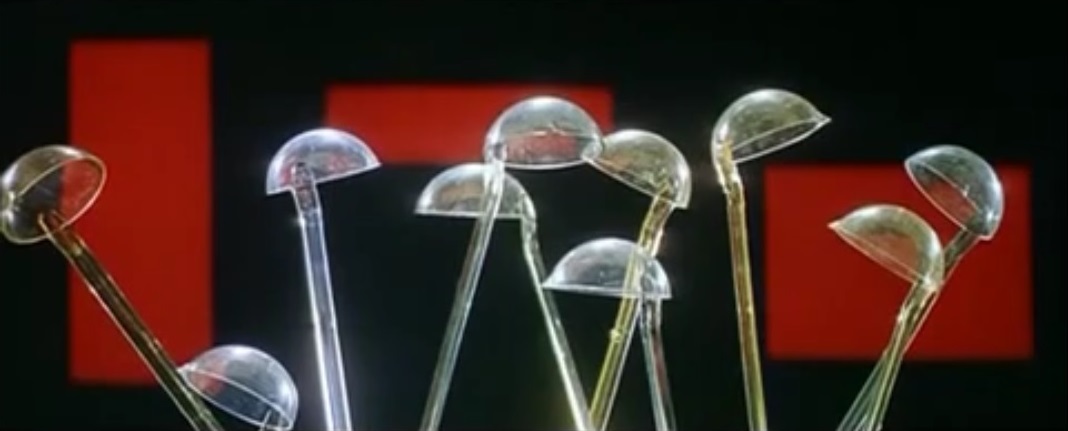
A poem by
Raymond Queneau on these “obscure
residues” back to their source, superscription from Hugo (“Ce siècle est grand
et fort. Un noble instinct le mène.”)
giving away the Homeric pun of Resnais’ title.

|
Vers les produits premiers, vers la matière abstraite Qui circulait sans fin, effective et secrète. |

The rest praised
to the skies by Godard in Arts,
“an Olympian film, of matchless gravity... Alain
Resnais has definitively mastered the secret of matter,” and Cahiers du cinéma, “Alain Resnais is the second greatest
editor in the world after Eisenstein.”

Cf. Fritz
Lang’s Metropolis and William
Cameron Menzies’ Things to Come,
also Antonioni’s Sette canne, un vestito and Jean Mitry’s
Symphonie Mécanique.

Hiroshima Mon Amour
The Japanese
architect “in politics”, a former soldier,
whose family were in Hiroshima.
The French
actress playing a nurse in an international film on peace, very young she had
an affair with a German soldier during the Occupation, he was killed, she
suffered mightily.
Pas de deux.
They meet and
part, meet and part, give each other names, he is Hiroshima, she is “Nevers, Nevers en
France”, which in view of the film’s brief English dialogue
admits the possibility of a pun. They are both married. “C’est une histoire idiote.”
The final scene
but one takes place at a nightclub called Casablanca.
L’Année Dernière
à Marienbad
The
world-renowned and ultimate brainteaser ultimately founded on a screenplay of immortal
and classic simplicity, the basic premise of which amounts to
“haven’t we met somewhere before,” which the critics most
assuredly had not.
“Elaborate,
ponderous and meaningless,” said Newsweek in its review of the
week’s cinematic offerings.
“It has
its attractions for film buffs and cryptogram addicts, but is not for anyone
who simply wants to be told a story,” Leslie Halliwell revealed in Halliwell’s
Film Guide.
Consequently,
the explicit pun of L’Amour à mort fell on even deafer ears with a theme related to
Losey’s La Truite. The
result of all this helpless foofaw surrounding
Resnais’ and Robbe-Grillet’s dramatic
poem is the new and incompetent Rialto print.
Muriel
ou
Le Temps d’un retour
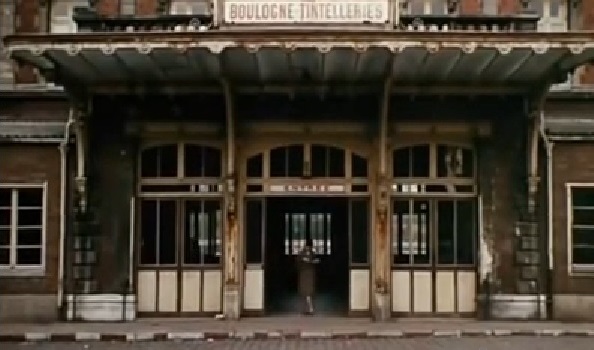
Boulogne-sur-Mer. “When he learned that Resnais’ new film was called
Muriel, Hitch asked me to tell
Resnais Muriel’s real story:
“Two
fellows are walking in the street when all of a sudden they see an arm in the
gutter. ‘But that’s Muriel,’ cries
the first. The other shrugs his shoulders. ‘How do you know?’ A
little farther on, they come on a leg, and the first man recognizes Muriel
again, but the second is still skeptical. A second leg
a few yards farther on still does not convince him. They
turn a corner and there, next to the gutter, is a head. ‘There,
what did I tell you?’ cries the first. ‘Now,
you can see that it’s Muriel.’ The second
fellow, succumbing to the evidence, runs over, picks up the head, hugs it in
his arms, and cries, ‘Muriel, what is it? Is
something wrong?’” (Truffaut)
From the writer
of Nuit et brouillard. The martyr city, full of new construction, with its
casino, a tale of torture and death. Constituent
elements, all that’s needed is the fraud and bankrupt. The
guests in Edward Albee’s A Delicate
Balance (dir. Tony Richardson).
Judith Crist and Andrew Sarris praised it, the latter in a
particularly interesting Village Voice
review. “A very bewildering, annoying
film” (Bosley Crowther of the New York Times, also rejecting De Sica, Shavelson, Castle, Carreras, and Annakin).
“Impasse” (Tom Milne, Time
Out Film Guide). Halliwell’s Film Guide, “fails to satisfy.”
Superb score by
Hans Werner Henze.
La Guerre est finie
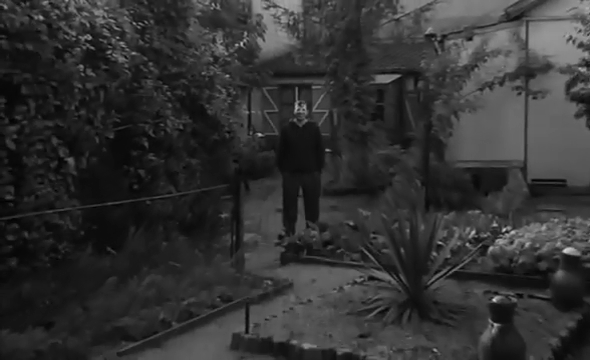
One may as well
stay home, in Spain or France, as fight the war over again, in open defiance of
Zinnemann’s Behold a Pale Horse and for all it’s worth.
Perfectly
admirable syntax expresses this horrible dictum.
Variety and Time Out Film Guide praise the film as
Resnais’ “most mature”, “most orthodox”, respectively.
Je
t’aime
Je t’aime
An office worker
(sales campaigns, client correspondence, formerly a shipping clerk) has a
mistress who is Baudelaire’s ideal, beautiful and sad. He
finds her boring, she dies, dying of boredom he shoots himself.
A clinic saves
his life, he’s chosen for a volunteer project to go back in time one
year, one minute only. It goes haywire, he relives
scattered moments of the affair, other affairs, much of his life, even his
dreams, and finally the moment when he shot himself. This
time he dies, despite similar efforts.
Resnais remade
this film as L’Amour à mort, which
is sufficient commentary.
Stavisky
He coolly writes
a note on his card, whispers in a bellboy’s ear (all of this while luring
a Count with talk of money in large sums), and a well-dressed lady across the
room is glorified with baskets of flowers. “By five
we were in bed, by seven I had the diamond necklace she was wearing, at a
fraction of its value,” this to his wife, who is thrilled, he has beaten
a rival, thus “le gangster Stavisky” and his moll. The Fascist leagues and Trotsky are part of the landscape,
he is a chevalier d’industrie “minting
money”, he started out pilfering dental gold
from his father’s office.
A small
adjustment of Resnais’ technique displays its virtuosity. Slight cranework added to the
dolly with pans is sufficient to encompass the period, along with extraordinary
attention to detail. Coriolanus, the Empire,
newspapers, cops and robbers, the great politicos. His
colleagues assert his madness before the tribunal, he
ought to have laid low and could not.
Men with
chimeras, Baudelaire is cited in quite another connection. The
mint is shown on Hawaii Five-O in “The Finishing Touch”
(dir. Charles S. Dubin). Billion
Dollar Bubble (dir. Brian Gibson) reiterates the ending. The
man in all his angles, cut like a diamond, just a
crook.
Exquisite score by Stephen Sondheim (whose main theme is Django Reinhardt’s “Cavalerie”).
Providence
Hemingway’s knife (“not such a bloody
innovator”), The Scales of Time (“borrow the title”),
a Victorian telescope (“admire the workmanship”), these form a
constellation,
|
Gazed
on unto my setting from my rise Almost
of none but of unquiet eyes. |
The initial conjunction is problematic, chimerical, lycanthropic,
it is the “aboli bibelot d’inanité sonore”.
“Victorieusement
fui”...
“Nue en le
miroir”.
“Le septuor”.
Mon
oncle d’Amérique
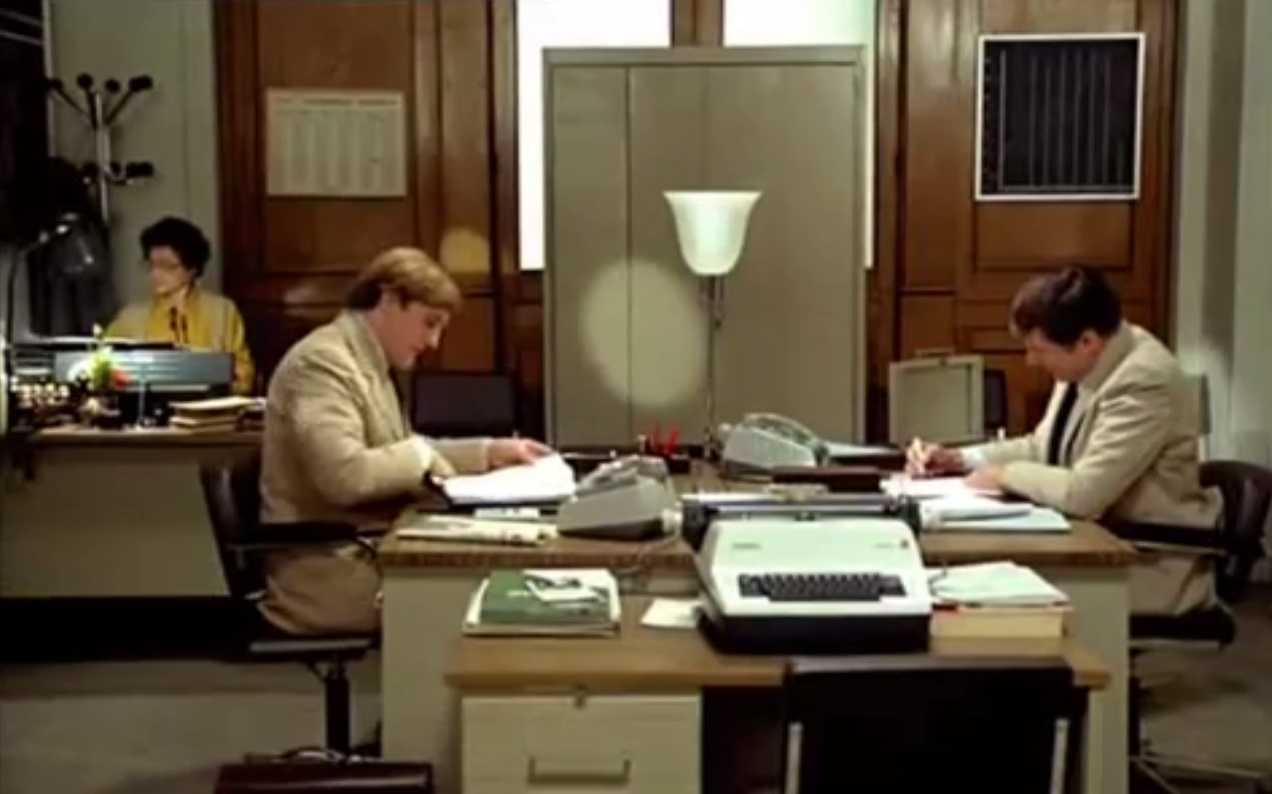
To live is to
defend a form, Webern citing Hölderlin, elaborated
by Laborit. To live, to
remember, to create, essential functions.
A textile executive finds an opposite number assigned to him one
day, full of big ideas and from a rival firm, pending a merger. Against his wife’s wishes, he accepts a position at
a “recent acquisition” some distance away, where he began. At that firm, a lady executive having an affair with her
boss demotes the new hire, he attempts suicide. “L’angoisse, c’est impossibilité de dominer une situation,” scientifically observed by Henri Laborit, M.D., a specialist in human behavior among other
things. A general theory is stated, loose connections
are drawn with his basic analysis of lab rats, the modes are Catholic,
Communist, Républicain. Something as simple as a canceled program on the national
radio topples a ministerial appointee and sends a bureaucrat scurrying into
politics.
“What is easy for a rat in a cage, is more difficult for
man in society. Certain needs have been created by
this society, starting in infancy. And it is rarely
possible to satisfy those needs by resorting to combat when escape proves ineffective.” Education of the young, mysteries of the nervous
system. The mask of language, dominance and the group,
“hierarchical situations which hide behind language,” cp. On Connait la Chanson (“je ne regrette rien”).
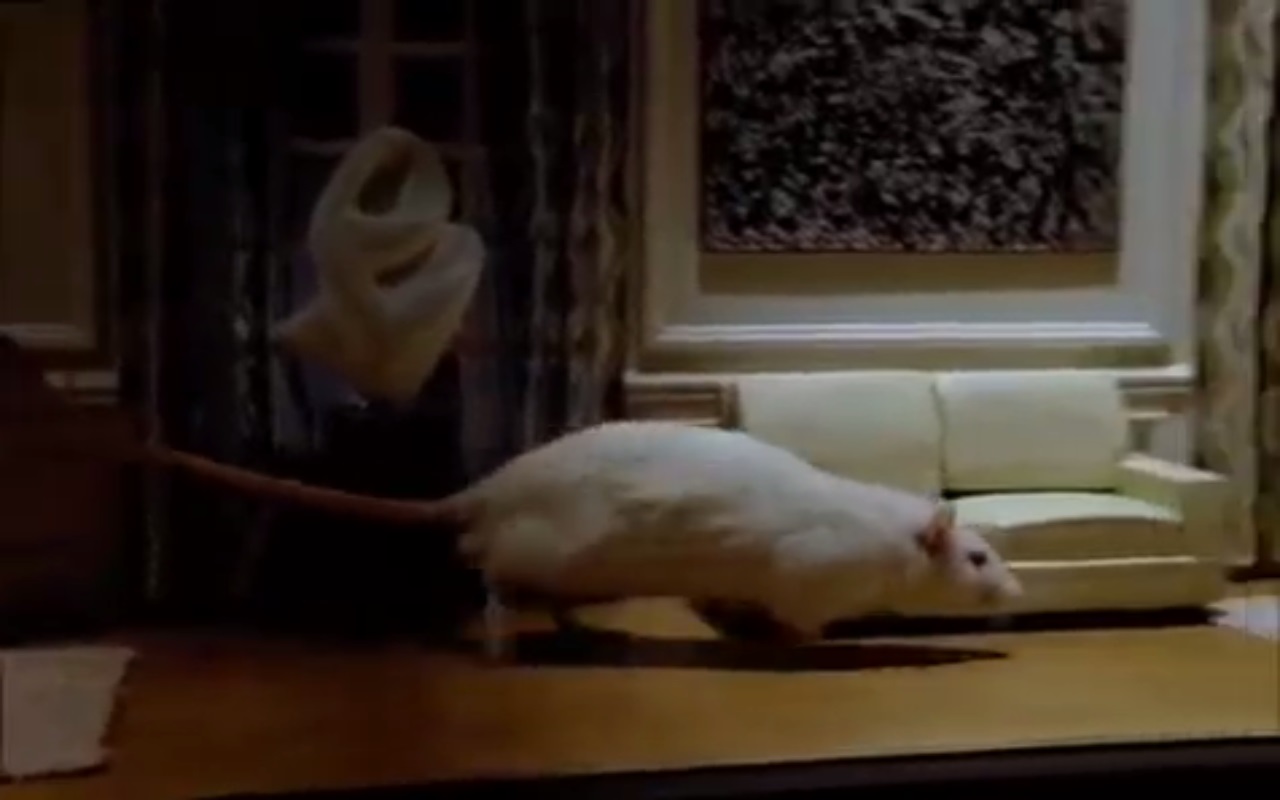
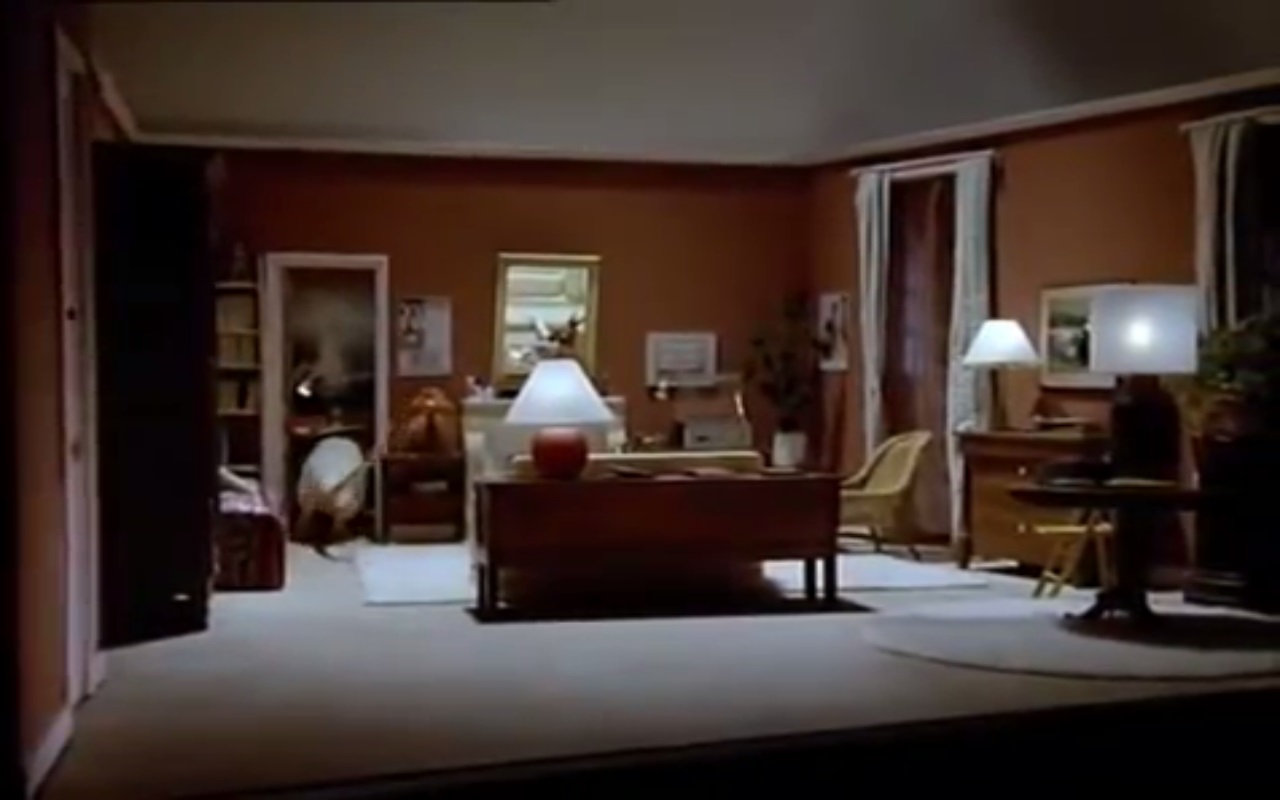
Three dramatic biographies are presented from birth to crisis
(four with Laborit), Truffaut’s L’Argent de poche is
practically cited in childhood, for example. The head
of news at Radiodiffusion
takes as mistress a scarcely rising actress who takes a position at the textile
firm. Their behavior is governed by mental processes
to which Laborit extends, without direct commentary,
an understanding. The three masterworks (four)
presented as one are recognizable from certain prototypes, Fellini’s Amarcord for the farmer’s table,
Capra at Bell Labs (“Histoire du
soleil”), etc. Burlesque occurs in the
formulation of acting models for the three characters. Jean
Gabin reflects the inner world of the executive, devout. The
news chief, on the staff of the Minister of Information, sees himself as
Danielle Darrieux carried in the arms of Jean Marais, who happens to be the former actress’s idol.
The punchline of the joke is the last straw, amidst all the
business maneuvers squeezing the textile executive out “like a comedo”, as Dali would say, an offer to accommodate
his passion for cooking with a line of gourmet franchises, “do you
furnish the apron and chef’s hat,” he asks.
Amid the detached comedy, the destruction of society builds a
case on the fragility of mental structures, Resnais films the Bronx as
wasteland in a coda to establish the consequences. “He’d
been a doctor in World War I, so he was disgusted with mankind, especially
doctors.” The comedy is of an executive staring
across his desk at a rival who turns out to be his boss’s mistress. The tragedy is a matter of devastation on a wide scale,
real or potential.
Vincent Canby of the New
York Times, “it brightens a truly dreary season.”
TV Guide, “less
artistically adventurous than earlier Resnais work.” Jonathan
Rosenbaum (Chicago Reader),
“dead-on portrayal of French yuppiedom in its
early ascendancy”. Time Out, “proves that surrealism lives.”
Halliwell’s Film Guide,
“basically pessimistic”.

La Vie
est un Roman
A consummate satire of the whole kit ‘n’ caboodle,
social, material, educational, architectural, eleemosynary, you name it, all
sounding brass and tinkling cymbals, or even murderous. Resnais’
colleague Robbe-Grillet had founded the premise ten years before in N. a pris les dés..., a satire of
deconstruction.
Let it fall, children of all ages get their education from life,
as Dickinson and Webern understood. The structure is
all one, in various aspects, and continuous.
Janet Maslin was confused. Resnais said, “we wanted to make a comedy”, a
musical comedy, in fact, and one of the funniest. “Pointlessly
knotty,” she called it, the critic’s sour grapes.
Somewhere between Truffaut’s L’Argent
de poche and Capra’s or Parrott’s Lost
Horizon, the great business of raising human beings goes on despite
crackpots and tinkerers of every stripe.
L’Amour à mort
L’amour c’est la mort expressed as a simple dialogue
with asides on the telephone, as when his father calls with a rebuke for
leaving wife and children and not taking calls.
The main parley is with a pair of married ministers, on eros and agape (cp. Cœurs).
This snow descends intermittently in darkness, accompanied by Henze’s splendid music.
Mélo
The first violinist of the Colonne
Concerts Orchestra goes off serious music and becomes artistic director of a new
casino in Tunis.
This follows upon the suicide of his wife and accompanist, about
to be caught poisoning him.
Her affair with a touring violinist, fellow student of his at
the conservatory, is the reason.
The aggrieved husband has remarried and now has a son, he knows nothing but has suspicions and her suicide
note, addressed to him, a fragile document kept in a safe deposit box.
I Want
to Go Home
The attraction of criticism, that it should confer upon the work
its license or verification, is conceived first of all as academic, finally as
monstrous. The correct relationship is then pointed
out.
These are the main lines of action, but there are many
subsidiary channels. French criticism as an art
well-practiced goes up and down the flagpole, it’s Baudelaire’s and
Mallarmé’s translations of Poe with a modicum of explication, the thing
speaks for itself or it doesn’t.
Comic strips are the ostensible subject, with a side bet on
films, because it’s an arcane métier that looks simple but affords
a certain angle of view on Paris culture and academia. The
American cartoonist played by Adolph Green (a very sage piece of casting, like
all the rest) descends the staircase of a Paris art gallery, the posters behind
him on the wall present a view of what is inimical to his understanding (Jim
Dine, Chinese Cinema, European bandes dessinées), he doesn’t speak the language, the
gallery director doesn’t recognize him. His
characters are Hepp Catt
and Sally Catt, carefully invented by Jules Feiffer so as to reflect a style of cartooning that evokes Krazy Kat or Felix the Cat, no drawn backgrounds, stern
comic expressions, they turn up as well-animated thought balloons (for the
which cp. Hue and Cry, dir. Charles
Crichton) to address the cartoonist and his daughter (Laura Benson), who is at
the Sorbonne with a thesis on Flaubert. The device has
a secondary association with the intimate effects of a daily comic and its
private insights on a public scale, one of many rapid considerations in the
film. The cartoonist started way back when, knowing
nothing of the newspaper business or France or anything outside Cleveland, his
daughter’s elusive Sorbonne professor (Gérard
Depardieu) is a connoisseur.
A widely social animal, the professor, he keeps a robustious American film director (John Ashton) in his
coterie long after even French critics have forsaken him, the director’s
lovely wife (Caroline Sihol) is ready to move on to
another celebrity, maybe the cartoonist if he is one really, or perhaps the
very source of celebrity, the professor.
The cartoonist’s girlfriend (Linda Lavin)
used to work for Disney, she can draw anything from
Mickey Mouse to Mighty Mouse, defends the cartoonist against his
daughter’s pretensions and also receives an amorous embrace from the
professor.
Green as the cartoonist, a long way from home, trying to put a coin
somewhere, anywhere, in a card-operated publiphone,
“God damn, God damn, God damn!” He wants
to go home, the lady of the house (Micheline Presle) likes this particular triste
Américain, she’s
the professor’s mother.
The daughter goes back home, the cartoonist stays, on his own
express condition that he indulge in no maudlin American-style confidences. This follows on a scene where, lost in the country town on
his way to the airport, unable to make himself understood, his drawings win him
admiration at a local café-bar. He’s
old-fashioned personally, démodé and all that, but talent wins out and
what’s not to like?
The critics could not admit this film, some have shouted it
down, but the public didn’t care for it either, Resnais’ critical
insight is too sharp and very advanced, particularly where it concerns itself
with the comic strip. A later museum exhibition of
American comic strips from their inception to the present, comprising several
rooms on a mammoth scale, ended in just the sort of ambience Feiffer’s and Resnais’ cartoonist could not
abide.
Meanwhile, a supremely artful and intelligent film, absolutely
hilarious, went begging at the box office but left the truth of its
asseverations throughout the press.
Smoking/No
smoking
The woman chaste or unchaste. Each has
her foibles and her adventures.
The significant form is that supplied by the presence of only
one actor and one actress as husband and wife and all the other roles.
A character states his position, walks off and re-enters as
someone else, the gardener, for instance, or the cuckolded best friend, or the punkish servingmaid, or the best
friend’s wife, and so on. The rich humor of the
dramatic continuity is abetted by cadences set five days or weeks or years
after a scene or sequence, and by introducing repetitions that mirror the
entire work in the guise of revisions. Each of the two
films is started again several times at an earlier point, a character states a
different position in the scene, there is the semblance of a new sequence
begun.
All exteriors on a sound stage resembling Providence and Olivier’s Henry
V. One of the funniest things ever put on film.
On Connait la Chanson
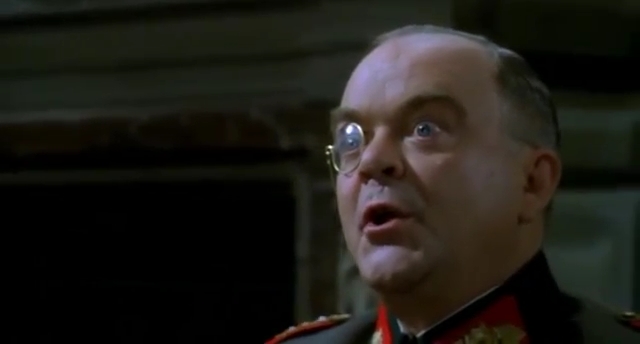
“Hommage à Dennis Potter” évidemment (Same Old Song), and Von Choltitz (cp. Paris brûle-t-il?, dir. René Clément).
It opens before the fact like Pozzo preparing his dithyramb, or Calvino (Se una notte d’inverno
un viaggiatore), “ça va? Tout le monde est là?”
The general is said to have been of two minds, Le Lac des cygnes
for that and Josephine Baker (“J’ai deux amours”) as well, “Les Chevaliers paysans
de l’an mil au Lac de Paladru”,
too (a viva at the Sorbonne, cp. I Want to Go Home). Lebensraum is a
concern, “a better class of person”, that
sort of thing.
“An advert for breakfast cereal,” cf. Potter’s Follow the Yellow Brick Road (dir. Alan Bridges).
Mon oncle
d’Amérique for the ready characterizations
provided by the songs, if they be not the wisdom of the people or mother wit. “My father gave you free rein but it’s
different now.” Thérèse Desqueyroux (dir. Georges Franju) at the
next table, “je ne regrette rien.” An inspection of the accommodations, the impatient
wife back home, shifts and alliances...
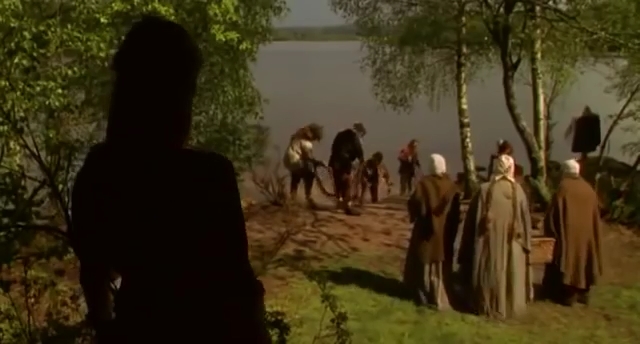
Camille the tour guide, Odile her
sister... “The amazing thing about them is their
serenity and independence. We can learn from
them.”
“They’d teach us a thing or two, if only we
listened.”
“And they’re so intelligent! Right,
Camille?”
“Uh?”
“Dolphins.” Welles’ The Lady from Shanghai, an octopus
there, here une méduse. Pecking orders, culture and kultur. “What
am I doing here? If I leave now, I’ll look
like...”
“You don’t know anyone...”
“No, I feel really uncomfortable.”
“Why did you come?”
“I didn’t want to. But I
came.”
“Oh, right. It’s not
simple, is it?”
“Anything but.”
“Eat something, like me. It keeps
you busy, it makes you look unconcerned. I eat all the
time at parties.”
“I’ll eat then.”
“Resist,”
says the song, “show the world you
exist!” Even the octopus. “How
long does depression last?”
“I don’t know... Mine has
lasted four years.”
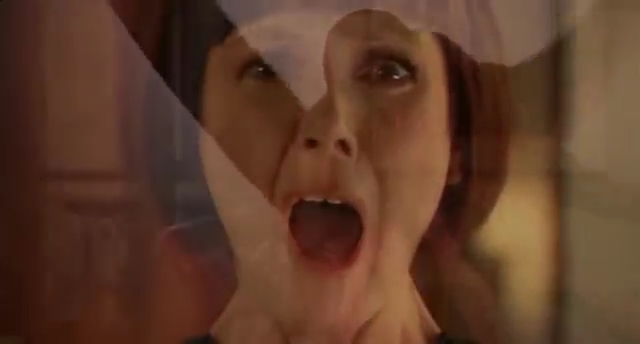
Seven Césars, Best Film, Best
Screenplay, etc.
Gérard Lefort (Libération),
“inouï, superbe, excitant, génial,
bouleversant, drôle,” citing Truffaut (La Femme d’à coté), “j’écoute uniquement les
chansons parce qu’elles disent la vérité. Plus elles sont bêtes, plus
elles sont vraies. D’ailleurs, elles ne sont pas bêtes. Qu’est-ce
qu’elles disent, elles disent: Ne me quitte pas... Ton absence a brisé ma
vie... ou bien Sans amour on est rien du tout.” Stephen Holden
of the New York Times, “what does
it all add up to? Not a whole lot.”
Lisa Nesselson (Variety), “unpretentious pic”. Marjorie Baumgarten (Austin Chronicle), “sadly...
nothing but a trifle.” Mick LaSalle (San Francisco Chronicle), “a
pleasant bit of fluff.” Time Out, “that clichéd passions simmer beneath the blandest
exteriors.” Daniel Eagan (Film Journal International), “oddly inconsequential”. Jonathan Rosenbaum (Chicago
Reader), “a comedy about real estate and class differences.” Trevor Lewis (Empire),
“most whimsical and charming”. Film4, “French whimsy”.
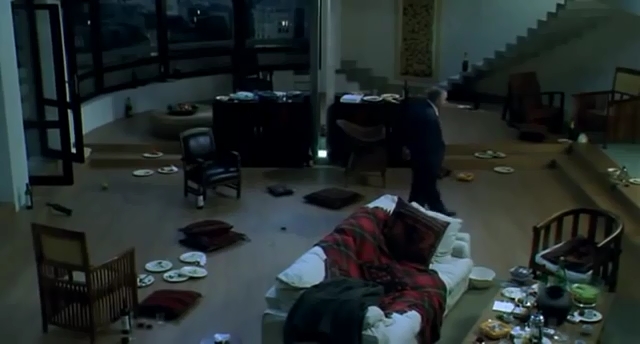
Pas sur la bouche
The digital intermediate.
It’s the American husband who wouldn’t be kissed on
the lips.
Au contraire, the Frenchman is frank.
An operetta written in 1925 serves the turn brilliantly, but for
the muddy colors.
Long takes in the musical numbers, the title tune for example.
As funny as a Lubitsch.
Cœurs

On Connait la Chanson resumed, even the “pile of
dishes”. The fraudulent immeuble is a CGI with snow
falling. Char and Bonnefoy
have the image of snow falling famously, even in Paris, cp. L’Amour à mort. “Avec la lente neige descendent les lépreux.” Private Fears in Public
Places. Mark
Snow score.
It ends in a tacit question posed directly to the camera in the
earlier film, its title, and again as with Last
Year in Marienbad there were no critics not found
wanting even in France, where to be sure they’d heard that song before.
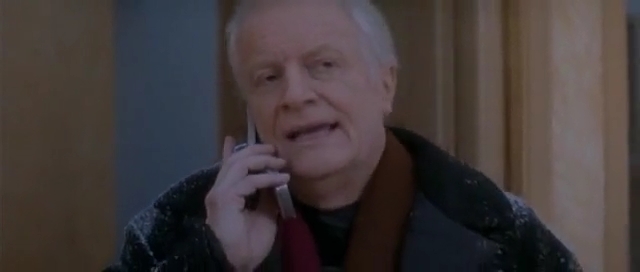
The bedroom is partitioned, cf.
Capra’s It Happened One Night. A videotape of ces chansons qui ont changé ma vie, “une émission présentée par géraldine castellani... habillée par Sarah
Rose et coiffée par Joyce Inzenose”,
with an architect and journalist who preaches “on a daily basis to defend
the homeless and the underprivileged.”
A veritable Lubitsch, The
Shop Around the Corner. The patience of the saints
(cp. La Symphonie
pastorale, dir. Jean Delannoy).
“A career soldier... buck stopper.”
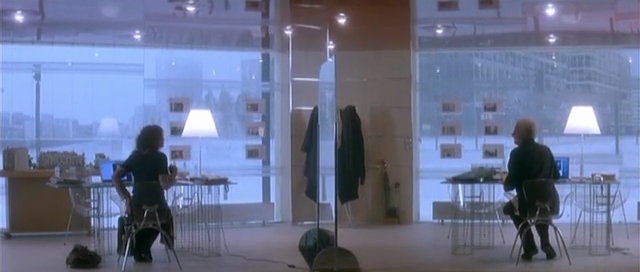
“God expects you to take up the challenge and resist. That’s why he sends you these trials.” The rat-maze dwelling of Mon oncle d’Amérique. “The curse of our times.” Ode
to videotape. “The hub of the universe,” a
hotel bar (cp. Hiroshima Mon Amour). “Onward Christian Soldiers”.
An Aged P.’s complaint. “The Long
John Silver Suite... GSOH,” Rue Oberkampf. Daniel and Lionel,
Martin and Sophia, Daniel and Gaëlle, at which point
it may be observed that, critics having altogether overlooked the point of Same Old Song, Resnais dispenses with
music on this occasion, to what avail we shall see. All’s Well That Ends Well,
“we just changed our minds, that’s all.”
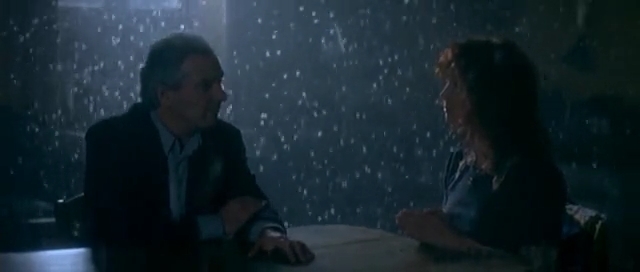
Manohla Dargis of the New
York Times, “six heavenly bodies as seen through a mighty telescope.” Jay Weissberg (Variety), “beyond fests,
it’s hard to see where the pic will play except
in Paris itself.” Jim Ridley (Village Voice), “a king-sized box
of Hollywood soapflakes.” David
Edelstein (New York Magazine),
“for its two sublime hours, all we need of the world.”
Jonathan Rosenbaum (Chicago Reader),
“dark, exquisite, and highly personal”. Ruthe Stein (San
Francisco Chronicle), “episodic French drama”.
Peter Bradshaw (Guardian),
“a real oddity... well-intentioned... stagey,
creaky, clunky... never at any point does the story take wing or take life...
neither comic, nor tragic, nor tragicomic... entirely inconsequential.” Geoff Andrew (Time
Out), “genuinely enchanting entertainment.” Catholic
News Service Media Review Office, “spiritually profound”. Jeff Vice (Deseret News),
“a little artificial.”
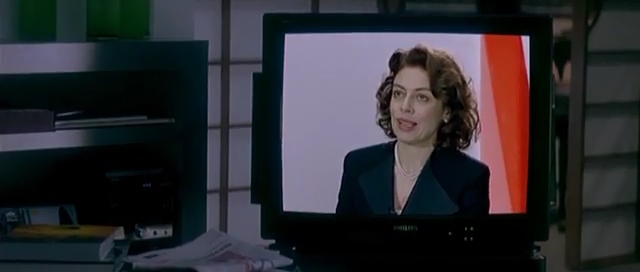
Les
Herbes folles
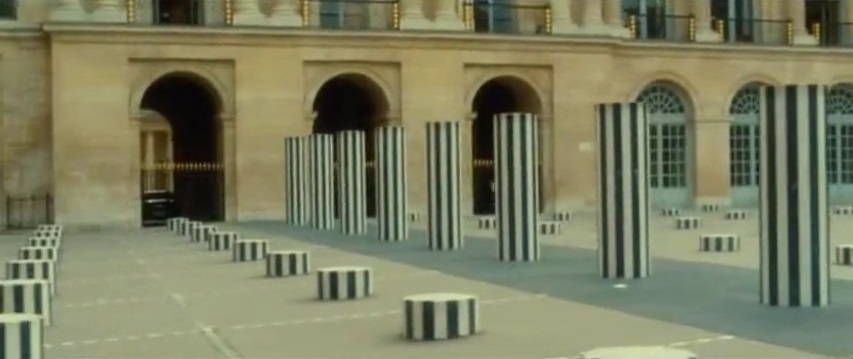
A woman whose feet aren’t ordinary, who has to go out of
her way to shop, “rien de vraiment
capital...”
Wild Grass.
“It’s
bound to stop in the end, it’s exhausted. Just
like me.” A shop full of wristwatches ticking,
payment in euros, mall cops. A certain provocation,
the thought balloons of I Want to Go Home,
filmed not drawn. “He had no rights. He couldn’t even vote, but he didn’t mind
that.” A Sartrean
tang, “he’d waited his whole life to stop thinking, at last, about
anything.”
Of course it’s the war, les flics
celebrate a promotion. Hommage à Hélène Boucher. The answering
machine. Sabotage, “nothing serious, but
it’s taking on such proportions.” A visit
from the police, “such things happen.”
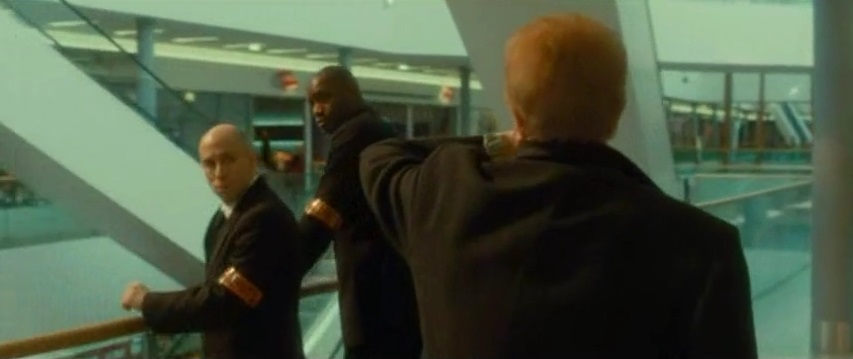
“Un monde. Un fossé. Et puis, leur point de
vu sur les hommes.” One is well out of it (Robson’s The
Bridges at Toko-Ri figures prominently),
“war is like that.” Un vrai Spitfire.
Qu’elle aille au diable,
Meryl Streep! at the Théâtre du
Rond-Point. The
raised hand in the dentist’s chair. An
unexpected opening at the front. “A perfectly banal
incident, something commonplace. But sometimes the
commonplace, the banal, can lead to, what? We shall
see.” Something on the order of Pinter’s
“brandy balls” (cp. La Vie est un Roman).
“Never mind,” says Flaubert, “we shall be
truly loved.”
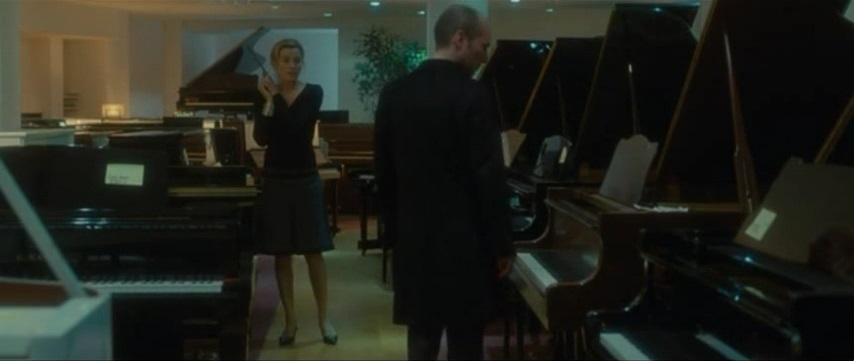
Stephen Holden of the New
York Times, “a dialogue of the ego and the rampaging id.” Jordan Mintzer (Variety), “Alain Resnais continues
his career-long experiment in filmmaking... playfully flamboyant
melodrama”. J. Hoberman
(Village Voice),
“insufferable”. V.A. Musetto
(New York Post), “a tale of l’amour fou.” Ty Burr (Boston Globe), “playful unto
tediousness.” Roger Ebert (Chicago Sun-Times), “carefree and anarchic.”
Rene Rodriguez (Miami Herald),
“the year’s most enjoyably baffling movie”.
Chris Hewitt (St. Paul Pioneer
Press), “bananas”. Kerry Lengel (Arizona
Republic), “how long are they planning to beat the horse of
existentialism?” Mick LaSalle (San Francisco Chronicle), “the
worst kind of avant-garde film.” Tim Robey (Telegraph),
“fiercely odd yarn”. Jason Solomons (Guardian),
“tiresome whimsy.” David Jenkins (Time Out), “joyfully skittish
farce”. Anton Bitel (Film4), “a mannered farce and a
flight of fancy.” Jennie Punter (Globe and Mail),
“may set your head spinning”.
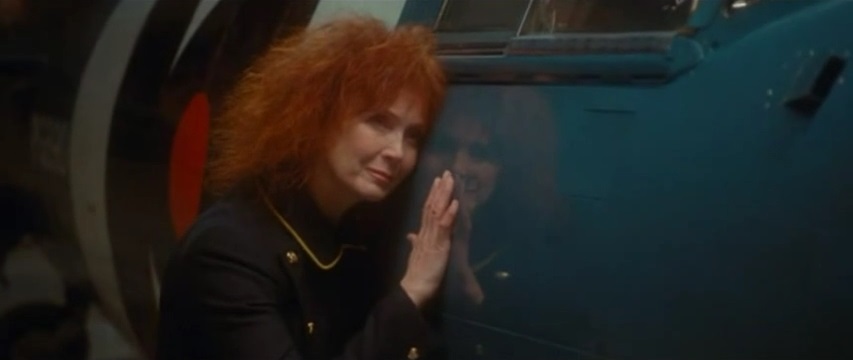
Vous n’avez
encore rien vu
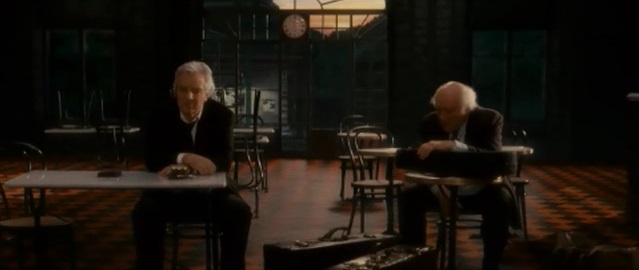
The recorded will (Metzger’s The Cat and the Canary, Robbie’s “The Adventure of
Veronica’s Veils” for Ellery
Queen, etc.), the late playwright of Eurydice,
actors in the various roles over the years are gathered by his “sacred
wish”. They are to view rehearsal footage and
permit the Compagnie de la Colombe
to perform the play or not.
Anouilh’s Eurydice, also
Cher Antoine ou L’Amour raté.
Orphée et son père, poor, fiddling and harping for sous. The gathered performers chime in with their lines. Eurydice’s mother a touring actress,
“you’re not much of an artist.”
Peter Debruge (Senior Film Critic, Variety) identified this as “a
downright stodgy piece of material” that “doesn’t really
warrant this sort of attention” (not the Senior Drama Critic), therefore
much ado about nothing. Peter Bradshaw of the Guardian gave the date of the play as
during the Occupation and said “the film is prolix, inert, indulgent and
often just plain dull... a stately and self-conscious piece of work, though
with a quaint kind of elegance and poise.” Todd
McCarthy of the Hollywood Reporter
described Anouilh as “eminent” but
thought the film “could have achieved more resonance” as A Chorus Line, with “the
interpersonal histories of the actors”. Actors
act, it is their métier. Rehearsals are not their
finest hour. A little Musset. The lovers eject the actress and her leading man,
“something very serious is happening here.” An
amusing dialogue with the screen (cp. The Purple Rose of Cairo, dir. Woody
Allen). “They were so ugly, weren’t they? So ugly, so stupid.”
“Forget about them.” A.O.
Scott of the New York Times described
it as “a thought-experiment driven above all by emotion.” And, au
contraire, Gary Goldstein of the Los
Angeles Times found it “unexpectedly resonant,” so there. Geoff Andrew (Time
Out), “wise, witty and thought-provoking.” A
digital train passes in the night. Eurydice has a
lover in the troupe. “Questions can be terrible
weapons.” Orpheus leaves the road. “Je ne pars pas, Papa... je ne prends pas ce
train.”
“Je te maudis. Ça te coûtera cher.”
Orpheus
and Eurydice are alone, “trop pauvres, trop nus, it was unfair having to risk everything at once.” The title is from Al Jolson
in The Jazz Singer (dir. Alan
Crosland). The fatal words, “c’est difficile,” spoken in sleep,
“comme une personne comme il faut.”
Her agent mocks, “une fille extraordinaire!” After
her death he asks, “what was she doing on the Toulon bus?” After all, Resnais might say, we can’t all be
Cocteau. The train again, “death, alone, is a
friend.” Again the train, “are you there?” After all, as Char might say, “at daybreak
we’ll be free.” Alain Cuny was the
original Orpheus in 1942, Lambert Wilson played the part fifty years later. “Accept being happy. Please...”
“I can’t, some words must still be said.” The train. It takes all
sorts in the theater world (cp. Rossellini’s Roma—città aperta). “It’s a mischievous title”, wrote
Jonathan Romney in Screen International,
“nowhere near as barmy as his last feature... cerebral...
unapologetically rarefied—indeed, somewhat academic... unashamedly
experimental... slippery”. Eurydice and her
mother are Les Deux
Orphelines of Griffith’s Orphans of the Storm, on tour. As in Melville’s films, blackmail and bribery, the
“lever of love”, are central to the dilemma. The
rest explains itself, if explanations were needed for the profession. The train yet again...
Perpignan, center of the
Dalian universe, “deux euros supplémentaires”.
Rimbaud’s Nina,
“et mon bureau?”
Aimer, boire et chanter
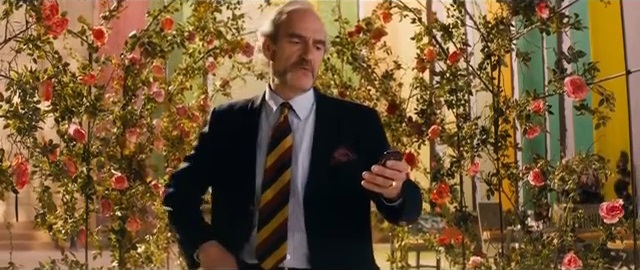
The little play and its everlasting George, Relatively Speaking, a digital film (cp. Pas sur la bouche). “George chose one path and I took another. He stayed here. He married a
fellow teacher, Monica. Whilst I—I met Tamara
and made some money. We had Tilly,
then came back here. But George stayed loyal to our
old dreams and ideals. Whereas I—I sold out! But he never criticized me, never accused me—of
selling my soul.”
Question of marmalade, film
britannique (Life
of Riley). The title of course means “Wein, Weib und Gesang”, featured in the score.
“Ce
bruit de journal froissé, ça me rend folle.” Spring
to winter, day into night.
“Comme ils disent dans les westerns, ça fait
longtemps que les caravanes ne passent plus par ici.” Yorkshire (Steadicam), cartoon drawings, stage settings. Little arias in medium close-up with crosshatched
backgrounds, even a sigh. A call received on le portable in one’s pocket. “Allo.
Oui. Oui. Non. Oui. Oui oui—non non. Non! Je te dis que oui! Mais oui, oui! Merde!”
Cf. Lumet’s Bye Bye Braverman.
Stephen Holden of the New
York Times, “neither especially profound nor riotously funny.” Scott Foundas (Variety), “if Resnais had gone into the culinary arts instead of the
cinematic ones, then surely he would have emerged as a molecular gastronomist avant la lettre, whipping up foie gras-flavored cotton candy as if it
were the most normal thing in the world.” Kate Muir (The Times), “unbearably boring and
mannered.” Jordan Mintzer
(Hollywood Reporter), “exposing
the fraud that lies behind classic narrative structures.”
Jonathan Romney (Film Comment),
“what’s fascinating is the amount of formal mischief that Resnais
whips up.” Film
Journal International, “an accessible, organic
whole in spite of all its disparate parts and contradictions, making it an
original and entertaining bouquet for the fussier among art-house fans.” Michael Atkinson (Village
Voice), “a Wodehouse wannabe.” Peter
Bradshaw (Guardian), “amiable
but minor.” David Parkinson (Radio Times), “comedy of bourgeois
sexual manners”. Richard Brody (The New Yorker), “lighthearted and
free-spirited”. David Ehrlich (Time Out New York), “life is but a long rehearsal for a play that no one will
ever see...” Ben Sachs (Chicago Reader), “the universal struggle to create personal meaning in
lives bound by social convention.”